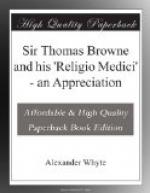the Pseudodoxia is full of the profoundest
philosophical principles set forth in the stateliest
English. The students of Whately and Mill, as
well as of Bacon, will greatly enjoy this part of the
Pseudodoxia. The Grammar of Assent,
also, would seem to have had some of its deepest roots
in the same powerful, original, and suggestive Book.
For its day the Pseudodoxia is a perfect encyclopaedia
of scientific, and historical, and literary, and even
Biblical criticism: the Pseudodoxia and
the Miscellany Tracts taken together.
Some of the most powerful passages that ever fell
from Sir Thomas Browne’s pen are to be come upon
in the Introduction to the Pseudodoxia.
And, with all our immense advances in method and
in discipline: in observation and in discovery:
no true student of nature and of man can afford to
neglect the extraordinary catalogue of things which
are so characteristically treated of in Sir Thomas
Browne’s great, if, nowadays, out-grown book.
For one thing, and that surely not a small thing,
we see on every page of the Pseudodoxia the
labour, as Dr. Johnson so truly says, that its author
was always willing to pay for the truth. And,
as Sir Thomas says himself, a work of this nature
is not to be performed upon one leg, or without the
smell of oil, if it is to be duly and deservedly handled.
It must be left to men of learning and of science
to say how far Sir Thomas has duly and deservedly
handled the immense task he undertook in this book.
But I, for one, have read this great treatise with
a true pride, in seeing so much hard work so liberally
laid out according to the best light allowed its author
in that day. As Dr. Johnson has said of it, ’The
mistakes that the author committed in the Pseudodoxia
were not committed by idleness or negligence, but
only for want of the philosophy of Boyle and Newton.’
Who, then, will gird up his loins in our enlightened
day to give us a new Pseudodoxia after the
philosophy of Bacon and Boyle and Newton and Ewald
and Darwin? And after Sir Thomas’s own
philosophy, which he thus sets forth before himself
in this and in all his other studies: ’We
are not magisterial in opinions, nor have we dictator-like
obtruded our conceptions: but, in the humility
of inquiries or disquisitions, have only proposed
them to more ocular discerners. And we shall
so far encourage contradiction as to promise no disturbance,
or re-oppose any pen, that shall fallaciously or
captiously refute us. And shall only take notice
of such whose experimental and judicious knowledge
shall be employed, not to traduce or extenuate, but
to explain and dilucidate, to add and ampliate, according
to the laudable custom of the ancients in their sober
promotions of learning. Unto whom, notwithstanding,
we shall not contentiously rejoin, or only to justify
our own, but to applaud or confirm his maturer assertions;
and shall confer what is in us unto his name and honour;
ready, for our part, to be swallowed up in any worthy
enlarger: as having our aid, if any way, or under
any name, we may obtain a work, so much desired, and
yet desiderated, of truth.’ Shall this
Association, I wonder, raise up from among its members,
such a worthy successor and enlarger of Sir Thomas
Browne?




